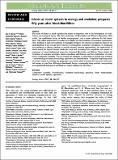Por favor, use este identificador para citar o enlazar a este item:
http://hdl.handle.net/10261/167061COMPARTIR / EXPORTAR:
 SHARE SHARE
 CORE
BASE CORE
BASE
|
|
| Visualizar otros formatos: MARC | Dublin Core | RDF | ORE | MODS | METS | DIDL | DATACITE | |

| Título: | Islands as model systems in ecology and evolution: Prospects fifty years after MacArthur-Wilson |
Autor: | Warren, B.H.; Simberloff, D.; Ricklefs, R.E.; Aguilée, R.; Condamine, Fabien L. CSIC ORCID; Gravel, D.; Morlon, H.; Mouquet, N.; Rosindell, J.; Casquet, Juliane; Conti, E.; Cornuault, Josselin CSIC ORCID; Fernández-Palacios, José María; Hengl, Tomislav; Norder, S.J.; Rijsdijk, K.F.; Sanmartín, Isabel CSIC ORCID ; Strasberg, D.; Triantis, K.A.; Valente, L.M.; Whittaker, R.J.; Gillespie, R.G.; Emerson, Brent C. CSIC ORCID ; Thébaud, Christophe | Palabras clave: | Diversification Speciation. Islands as model systems Island biogeography Genomics Ecosystem functioning Community assembly |
Fecha de publicación: | 2015 | Editor: | Blackwell Publishing | Citación: | Ecology Letters 18: p. 200- 217 (2015) | Resumen: | © 2014 John Wiley & Sons Ltd/CNRS. The study of islands as model systems has played an important role in the development of evolutionary and ecological theory. The 50th anniversary of MacArthur and Wilson's (December 1963) article, 'An equilibrium theory of insular zoogeography', was a recent milestone for this theme. Since 1963, island systems have provided new insights into the formation of ecological communities. Here, building on such developments, we highlight prospects for research on islands to improve our understanding of the ecology and evolution of communities in general. Throughout, we emphasise how attributes of islands combine to provide unusual research opportunities, the implications of which stretch far beyond islands. Molecular tools and increasing data acquisition now permit re-assessment of some fundamental issues that interested MacArthur and Wilson. These include the formation of ecological networks, species abundance distributions, and the contribution of evolution to community assembly. We also extend our prospects to other fields of ecology and evolution - understanding ecosystem functioning, speciation and diversification - frequently employing assets of oceanic islands in inferring the geographic area within which evolution has occurred, and potential barriers to gene flow. Although island-based theory is continually being enriched, incorporating non-equilibrium dynamics is identified as a major challenge for the future. | URI: | http://hdl.handle.net/10261/167061 | DOI: | 10.1111/ele.12398 | Identificadores: | doi: 10.1111/ele.12398 issn: 1461-0248 |
| Aparece en las colecciones: | (RJB) Artículos (IPNA) Artículos |
Ficheros en este ítem:
| Fichero | Descripción | Tamaño | Formato | |
|---|---|---|---|---|
| Islands as model systems in ecology and evolution.pdf | 460,14 kB | Adobe PDF |  Visualizar/Abrir |
CORE Recommender
SCOPUSTM
Citations
320
checked on 30-mar-2024
WEB OF SCIENCETM
Citations
305
checked on 17-feb-2024
Page view(s)
387
checked on 23-abr-2024
Download(s)
1.536
checked on 23-abr-2024
Google ScholarTM
Check
Altmetric
Altmetric
NOTA: Los ítems de Digital.CSIC están protegidos por copyright, con todos los derechos reservados, a menos que se indique lo contrario.
